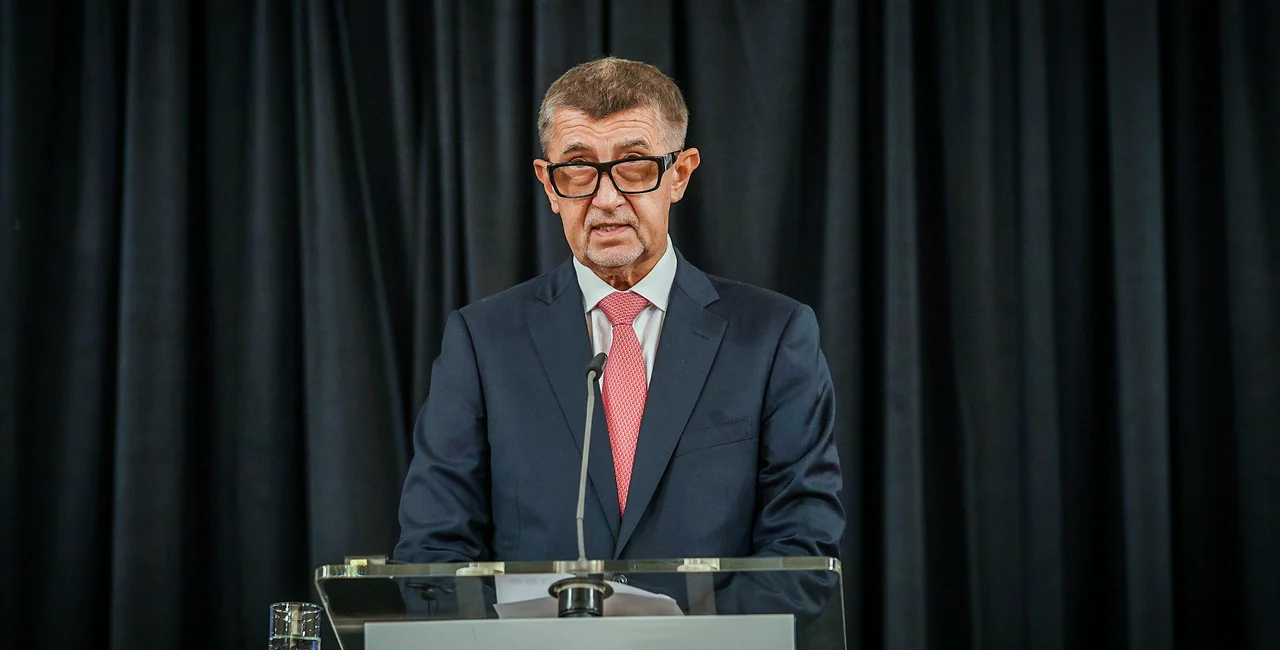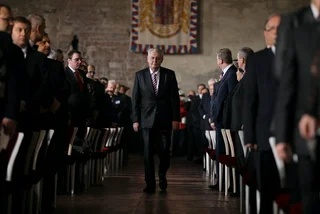The trial of former Czech Prime Minister Andrej Babiš, which started this morning, is being dubbed the “trial of the year”. With Babiš accused of assisting in EU subsidy fraud, the outcome will have wide-ranging impacts on the future of Czech politics.
At the same time, the trial underlines a deeper malaise in Czech democracy. Scandal after scandal has worn down trust in the people running the country’s affairs. And the replacement of Babiš’s government by a ‘democratic coalition’ in elections last October has not solved the problem.
This lack of trust has real implications. The Czech Republic made headlines around the world following huge protests against government policy on the Ukraine war in Prague on Sept. 3. And despite the humiliation of his trial, Babiš remains a favorite to win presidential elections next year, and his ANO party currently leads opinion polls.
Why is Babiš on trial?
Babiš’s trial will take place over thirteen days at Prague’s Municipal Court. It started at nine o’clock on Monday morning, with 40 witnesses scheduled to give evidence over the course of the proceedings.
Babiš stands accused of assisting in EU subsidy fraud for his role in the Čapí hnízdo (Stork’s Nest) affair in 2007. His former adviser Jana Nagyová is meanwhile accused of subsidy fraud and damaging the financial interests of the European Union.
Investigations into the Stork’s Nest case have run for years. The Stork’s Nest recreation and conference area was originally part of Babiš’s Agrofert conglomerate, but in 2007 it was transformed into a joint-stock company and received an EU subsidy for which it would not have qualified as part of Agrofert.
Later, the Stork’s Nest center returned to the Agrofert holding. The prosecutor argues Babiš dishonestly made the business eligible for EU subsidies worth around CZK 50 million, helping Nagyová, its then Vice-Chair, commit fraud.
The indictment read in court on Monday claimed that Nagyová “provided false information about Čapí hnízdo being an independent small- or medium-sized enterprise, keeping silent about the fact that the person actually controlling the company was the accused Andrej Babiš.”
The prosecution wants Babiš to be handed a three-year sentence suspended for a five-year probationary period. But the judge on Monday pointed out that Babiš could also face indictment for damaging the financial interests of the EU, in addition to the current charge of assisting in subsidy fraud.
Babiš claimed the trial is “of course politically motivated” and that he is “glad that everyone will see” his arguments against the “false indictment.”
"I committed no crime, I categorically reject this," he later told the court. "I have never stolen anything in my life, the subsidy was returned, no one committed corruption, no one scored a profit."
Why does it matter?
The outcome of the trial will have a major impact on the future of Czech politics. Although he hasn’t yet announced his candidacy, Babiš remains a favorite for presidential elections early next year, despite the controversy generated by the trial. Meanwhile, his ANO party consistently leads national opinion polls.
A guilty verdict would be a major boost for the flagging coalition, which defines itself in opposition to the claimed corruption of the Babiš government. It would also be a significant blow to Babiš’s suspected presidential ambitions.
The Million Moments for Democracy anti-corruption campaigning group today warned against the possibility of Babiš becoming the next Czech president. The group built a ‘prison office’ outside the court as the trial began, depicting Babiš carrying out his presidential duties from a cell.
"Even now, with Babiš on trial, he could still run for president, and he could do so even if he was found guilty," said Kristina Jochmannová from Million Moments for Democracy. "The installation is intended to draw attention to the threat and strangeness of a potential situation in which Babiš, who is already actively preparing for the role of president, really decided to run for office and succeeded in the elections."
Kristina Jochmannová, Million Moments for DemocracyWe wanted to highlight the importance of the presidential elections and how it is crucial to choose from democratic candidates who are not in danger of a court hearing, and certainly not those who may end up holding the presidential office from a jail cell.
On the other hand, a verdict in favor of Babiš would vindicate, in his supporters' eyes, his claim that the trial is a politically-motivated sham intended to discredit him.
Czech politics faces deeper problems
Unfortunately, either outcome will only deepen mistrust of politicians in the Czech Republic.
Trust in politics hasn't been helped by a series of corruption scandals involving the STAN (Mayor and Independents) coalition party since the new government took power. STAN politicians have been accused of participating in a system of bribery around public transport tenders in Prague, with party leader Vít Rakušan facing criticism for allegedly turning a blind eye to dodgy dealings.
The coalition as a whole is losing popularity and consistently trails ANO in the polls. Prime Minister Petr Fiala is among the least-trusted leaders in Europe, enjoying the confidence of only 22% of the Czech population. ANO is expected to win big in municipal and Senate elections later this month.
Looking ahead to the presidential elections next year, the climate of mistrust and cynicism will pose problems. None of the candidates for head of state have emerged as a unifying figure able to heal national divisions. And a Babiš win would make those divisions even worse.
This month's protests against the government’s policies supporting Ukraine highlighted the belief of many Czechs that politicians are simply not on their side. Babiš’s trial is the clearest manifestation of this supposed corrupt self-interest. But even a guilty verdict won’t solve the trust issues afflicting Czech democracy.












 Reading time: 4 minutes
Reading time: 4 minutes 





























